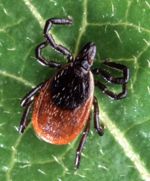Difference between revisions of "Arachnid Flashcards"
Jump to navigation
Jump to search
(→Ticks) |
(→Mites) |
||
| Line 106: | Line 106: | ||
|l2=Suborder: Astigmata, astigmatid mites#Sarcoptidae | |l2=Suborder: Astigmata, astigmatid mites#Sarcoptidae | ||
|q3=Is ''Sarcoptes'' as burrowing or non-burrowing mite? | |q3=Is ''Sarcoptes'' as burrowing or non-burrowing mite? | ||
| − | |a3= | + | |a3=Burrowing |
|l3=Suborder: Astigmata, astigmatid mites#Sarcoptidae | |l3=Suborder: Astigmata, astigmatid mites#Sarcoptidae | ||
|q4=What clinical signs present in an infection caused by ''Sarcoptes'' mites? | |q4=What clinical signs present in an infection caused by ''Sarcoptes'' mites? | ||
Revision as of 19:02, 6 March 2010
|
|
Arachnids
| Question | Answer | Article | |
| What are the two divisions of the arachnid body? |
|
Link to Article | |
| Summarise the arachnid life cycle |
|
Link to Article | |
Ticks
| Question | Answer | Article | |
| What are seed ticks? | Tick larvae
|
Link to Article | |
| How can you differentiate hard ticks from soft ticks? |
|
Link to Article | |
| True or False: Soft ticks can swell up to three times their body size whilst taking a blood meal |
|
Link to Article | |
| List the mouthparts of ticks |
|
Link to Article | |
| Fill in the missing words about soft and hard ticks:
Soft ticks feed ??? and on ??? hosts. Hard ticks take ??? at each life cycle stage and can feed on ??? different hosts during their life cycle. |
|
Link to Article | |
| What is trans-ovarian transmission and give an example of a species of tick which uses this |
|
Link to Article | |
| What is trans-stadial transmission? |
|
Link to Article | |
| What is the most important tick species in the UK, how many hosts does it feed upon and what disease can it spread? |
|
Link to Article | |
| What climate does Rhipicephalus species prefer and what is it a vector for? |
|
Link to Article | |
| Name some important soft ticks |
|
Link to Article | |
|
|
Link to Article | |
Mites
| Question | Answer | Article | |
| How many pairs of legs do adult and nymph mites have respectively? |
|
Link to Article | |
| What is the main feature which distinguishes burrowing mites from non-burrowing mites? |
|
Link to Article | |
| Is Sarcoptes as burrowing or non-burrowing mite? | Burrowing
|
Link to Article | |
| What clinical signs present in an infection caused by Sarcoptes mites? |
|
Link to Article | |
| Which species are affected by Knemidocoptes mites? | Avians
|
Link to Article | |
| What are the three main species of Knemidocoptes mites and what conditions do they cause? |
|
Link to Article | |
| Which species do Trixacarus mites affect and how long can it take before the infection causes death? |
|
Link to Article | |
| What shape are Demodex mites? | Cigar shaped
|
Link to Article | |
| What are the two types of demodecosis caused by Demodex mites? |
|
Link to Article | |
| What species do Notoedres mites affect? |
|
Link to Article | |
| What are the main species of non-burrowing mites of veterinary importance? |
|
Link to Article | |
| Do Psoroptes mites have segmented or unsegmented pedicles? | Segmented
|
Link to Article | |
| What are the two main Psoroptes mites of veterinary importance? |
|
Link to Article | |
| Do Chorioptes mites have segmented or unsegmented pedicles and what is the main species of veterinary importance? |
|
Link to Article | |
| Which non-burrowing mite causes otitis externa in dogs? | Otodectes cynotis
|
Link to Article | |
| Which non-burrowing mite causes walking dandruff? | Cheyleteilla
|
Link to Article | |
| What is Dermanyssus gallinae better known as and does it spend most of its time on or off its host species? |
|
Link to Article | |
| Which mites are often found in feed stores and bedding and what problems do they cause? |
|
Link to Article | |
| To which industry do Varroa destructor pose a major problem? | Honeybee farming
|
Link to Article | |
